It can be very jarring when your Toyota Aygo shakes when idle. If your Aygo has this problem, many issues can cause it. We’ve lined out some of the most common causes below.
The most common reasons a vehicle shakes when idling is a misfire or bad motor mount.
Table of Contents
Toyota Aygo Shaking When Idling Diagnosis
Check for Codes

There are a lot of reasons why your Aygo may shake when idle. Before trying to figure out what is causing your Aygo to feel like a washer full of towels, make sure the check engine light isn’t on.
If it is, get the trouble codes. That’s a great place to start. You can get an OBD II code scanner cheaply, or most auto parts stores provide a complimentary scan.
With these diagnostic codes, you’ll know which sensor is reporting a problem, which will narrow down your list of problems. When relevant, we’ve listed the applicable code in the “causes” section below.
Diagnostic Table
| Cause | Check Engine Light | Common OBD II Codes | Notes |
|---|---|---|---|
| Misfiring | Almost always | P0300, P030X (X= misfiring cylinder) | Noticeable misfiring sound, lack of power, and MPG may suffer. |
| Vacuum Leak | Sometimes | P0171 | You may hear a hissing sound. |
| Motor Mount | No | None | You should hear a slamming noise when shifting or letting off the gas. |
| Engine Timing | Sometimes | P0016, P0017 | Rough idle, decreased MPG, potential slapping sound. |
| Air Filter | Rarely | P0172 | Rough idle, decreased throttle response. |
| Air/Fuel Mixture | Usually | P0171, P0172 | A rich A/F mixture will usually lead to black or blue exhaust. |
| Hamonic Balancer | No | None | The engine will vibrate, but it’ll otherwise run fine. |
Causes
1. Ignition Misfire
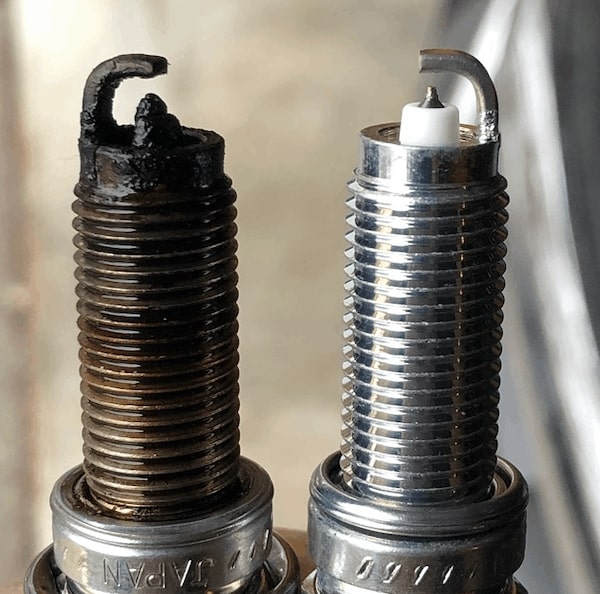
You’ll likely get a misfire code, such as P0300 or P030X (X being the misfiring cylinder number.
The ignition system is responsible for burning the air-fuel mixture that enters the combustion chamber. If your Aygo isn’t getting a good spark it will shake as it misfires and tries to stay running.
Here are the main components of the ignition system, as well as what would cause them to make your Aygo shake when idling.
- Spark Plugs– The spark plugs are one of the most common causes (if not the most common reason that your Aygo may have vibrations and shaking). Although most modern vehicles use iridium spark plugs, they need changing at Toyota’s recommended intervals. This page has a great chart to compare your spark plug condition to new ones. Here’s more on bad spark plugs.
- Coil Packs– Nearly all model years and engines use coil packs. They are fired by the PCM (powertrain control module) at precisely the right time to provide the optimal ignition timing. If a coil pack goes bad, it’ll cause a misfire and rough idle condition. Your Aygo will be running rougher at any RPM, but a misfire will be most pronounced at idle.
- Spark Plug Wires– While only some models and engine combinations of vehicles today come with spark plug wires (a lot are now coil-on plug), if your Aygo happens to have them, they can go bad and cause a rough idle. Here’s a great video on how to diagnose faulty plug wires with a multimeter.
2. Vacuum Leak
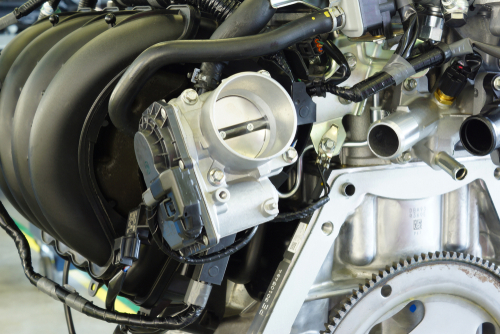
It may appear with P0171 (fuel trim lean) or no code. You may hear a whining or whistling sound.
Your Aygo’s engine creates a vacuum when running. The PCM knows precisely how much air enters the engine due to data from the MAF or MAP sensors.
If unmetered air (air that enters that didn’t pass through the MAF sensor) enters the engine, it will cause your car to shake when idle.
Here are some frequent vacuum leak locations:
- Between the MAF sensor and throttle body (some vehicles only use a MAP sensor)
- Intake gasket
- EVAP lines going into the intake
- Brake booster line
Diagnosing a vacuum leak can be tricky. Here’s a good YouTube video on how to do it.
3. Motor Mount
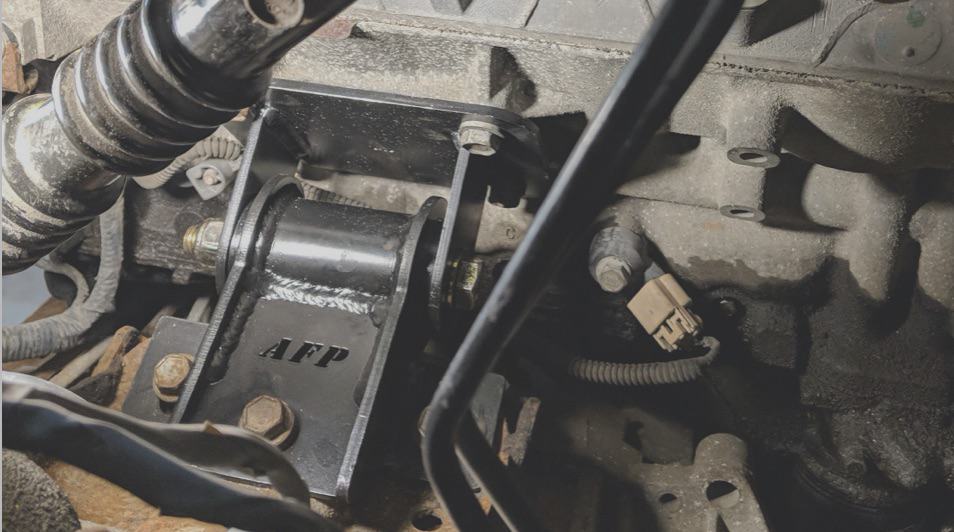
Shakes when idle, smooths out while driving, thunking sound when shifting, no code.
Your Aygo’s engine mounts connect it to the chassis. If they wear out, it can cause a shaking condition when idle.
You should also feel the shaking more in gear than when you are in park. It would also feel shaky as the transmission shifts through its gears.
An engine misfire is the most common cause of a shaking idle, and as the engine stumbles and misfires, it should be noticeable on the tachometer as a drop in RPM.
If the tachometer is rock steady, and the shaking seems worse out of gear than in gear, it indicates a bad motor mount
4. Engine Timing
You may hear a slapping sound inside the timing cover if the timing chain/belt is loose. You’ll likely see code P0016 or P0017.
If the timing belt or chain has jumped a tooth, the camshaft(s) and crank will no longer be lined up properly. When this happens, it can cause a lot of engine vibration.
Here’s an article on timing chain jumped symptoms if you believe this could be the problem with your Aygo.
5. Air Filter
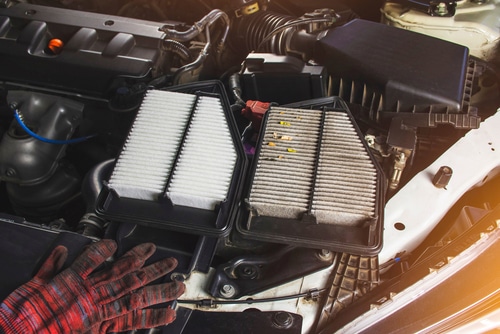
The air filter location is a favorite winter nesting place for rodents if they can get in there.
A dirty or clogged air filter will usually cause the idle speed to dip erratically when letting off the accelerator (so can a dirty throttle body).
If your check engine light isn’t on, checking out the air filter would be a great place to start. It’s readily accessible, sometimes the problem, and super cheap and easy to replace.
6. Air Fuel Mixture
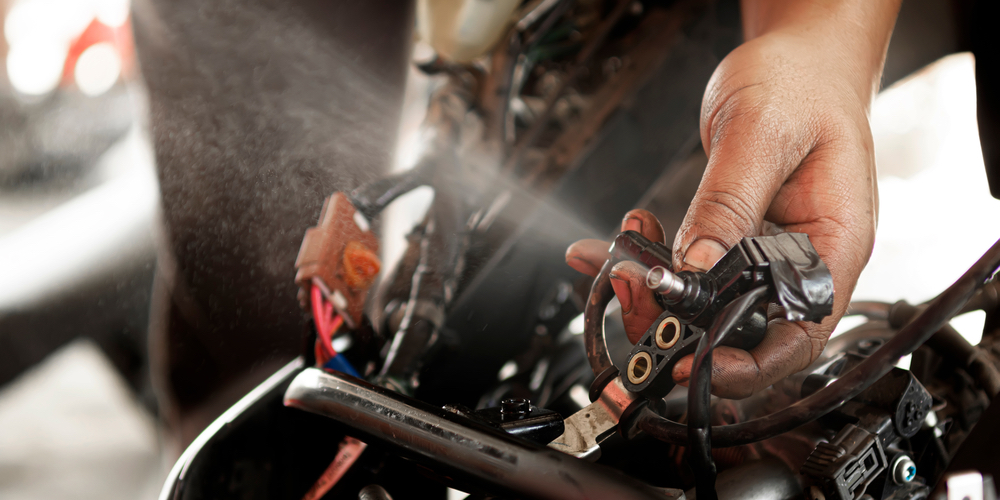
You’ll most likely get P0171 (running lean) or P0172 (running rich) if there’s an air-fuel mixture issue. You may also get a misfire code or O2 sensor code.
Fuel Injectors
Your Toyota Aygo’s fuel injection system atomizes the fuel into a fine mist. If a fuel injector is clogged or not operating properly, it will either let too much or too little fuel into the combustion chamber relative to the amount of air.
There are many reasons why a fuel injector may go bad, as well as different symptoms relative to how they went bad. For more, check out Toyota Aygo bad fuel injector symptoms.
O2 Sensors
Your Toyota Aygo’s O2 sensors monitor the exhaust to help the PCM determine the correct air/fuel mixture.
O2 sensors may have the most demanding job of all the sensors in your vehicle. They deal with the hot exhaust that can cover them in deposits that can leave them ineffective.
The exhaust heat can also bake the O2 sensor wiring going to/from them over time.
If an oxygen sensor begins to fail, it can make your Aygo run too lean (or rich). A super lean running engine will often shake when idling. The mixture would be wrong at all RPM, but the shaking decreases as the engine speed increases.
7. Improperly Balanced Engine
There’ll be no codes associated with a bad harmonic balancer.
If the harmonic balancer fails, it’ll cause your Toyota Aygo to vibrate at idle speed. As the crankshaft spins faster, the vibration will become less pronounced.
Here’s more on how to tell if a harmonic balancer is bad.
Shakes When Idle But Smooths Out When Accelerating
The reason your Toyota Aygo shakes at idle but smooths out when accelerating is that the engine is spinning faster, which smooths out any misfires.
If a motor mount is causing the problem, once you put the car into gear, the torque from the engine will hold it against the frame.

